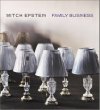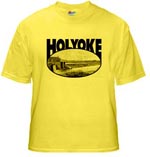by Laurel | April 30th, 2012
17 March 1933
Accused Woman Takes the Stand at Murder Trial
Mrs. Mary Walence Tells of Events on Night Her Husband Was Slain — In Tears Several Times
Mrs. Mary Walence of Holyoke, charged with the murder of her husband, Paul, early in the morning of July 11, 1932, took the stand in her own defense yesterday afternoon. Her trial is being held before Judge Daniel T. O’Connell and a jury in criminal session of superior court. In a voice which could scarcely be heard, Mrs. Walence told the story of that fateful night and of the days preceding it. Frequently, as she told of the harmonious relations which existed between herself and her husband, her voice broke. Several times the little white-faced woman gave way to tears, but she smothered her sobs — and at times her words — in her handkerchief, which she held tightly in her right hand.
For nearly an hour Mrs. Walence sat in the chair by the witness stand and told her story in reply to questions by Atty. Thomas C. Maher, chief counsel for the defense. Several times she paused to take a sip of water in an endeavor to recover her composure and several timed Judge O’Connell was obliged to ask her to keep her voice up that the 12 men on the jury might hear what she said. She was still being questioned by Atty. Maher when court adjourned for the day at 3:55 and it is believed she will be put on the stand again as soon as the court opens this morning at 10. It is also thought that the case may reach the jury tomorrow afternoon and there is a possibility that a verdict will be brought in before another 24 hours have passed.
Heard Him Return
The night of her husband’s death Mrs. Walence and her daughters retired about 10 or 10:30, she testified. Mr. and Mrs. Walence and their daughters had been to Hartford that afternoon by automobile. They had returned home about 6 or 6:30 and after supper Paul went out. She next saw him about midnight, when he returned. She said she had been awakened by the slamming o the garage door and she heard him come into the kitchen and then into the bathroom. While in the bathroom he changed to his pajamas.
Shown a picture of the bedroom, Mrs. Walence wept as she pointed out her bed and that of her husband. Her attorney urged her to compose herself and helped her to drink some of the water which was in a tumbler on the stand beside her.
Regaining control of herself, Mrs. Walence, under the kindly questioning of Atty. Maher, continued with her story. Her husband came over to her bed and sat down beside her. He had been drinking, she said, because she smelled the liquor, but she denied that he was drunk.
“I ask hm if he were very busy that he come in to late,” she said. She then declared that he explained to her that he had started to come home at 11 and then two men came in and he sat drinking and talking with them for another hour. He then told her, she related, that if she cold run the place better than he could, to do so.
Husband a Bootlegger
Previously, Mrs. Walence, in answer to a question as to the nature of her husband’s business, had said he ran a grocery store and a speakeasy. “He was in grocery store and liquor — bootlegger,” she said in her rather hesitant and somewhat limited English.
After talking for about 10 minutes, she said her husband got into his own bed and she turned over toward the window, with her back to her husband’s bed, when she went to sleep.
She testified that “some kind of noise” woke her up, but that she was not fully awake at once. Then she heard to noises “something like someone makes Fourth of July.” In answer to the question as to where these noises came from she replied” —
“It seemed to me like it was on the outside of the house.”
The defendant said she lay still and listened for a while and heard some noise near the window near the closet, but did not know what that noise was. She then got out of bed but did not see anyone. She called Paul, and he didn’t answer, and she started from the side of her bed toward the light switch. The way led around the foot of her husband’s bed, and just as she reached the foot of the bed, her daughter, Stella, turned on the light in the bedroom. It was then she saw her husband had been shot, and she started to cry and to scream.
Memory Fails
She said the children cried, too, but that she was so upset that she does not know what happened next. The next thing she knew she was in the kitchen, but how she got there she said she was unable to tell. The children gave her medicines there in the kitchen and wiped her face with wet towels.
At this point Atty. Maher questioned her about the medicine. She said it was some she started taking about a year before for nervous spells and a pain in her back, but that it had been four or five months before she had seen a doctor.
She remembered, she said, men coming into the kitchen, and although she knew that they were police officers she did not know their names. “Stella asked me something about poppa coming home,” Mrs. Walence said, and she talked with one of the police officers through Stella, who acted as interpreter.
She told of remembering Capt. Cullen coming to the house, and of seeing him afterward at the police station. She said that while she was in the kitchen, Capt. Cullen told her to get dressed, that she had to go to the police station. For quite a long time, more than two hours, she estimated, she was questioned at the police station. The Polish language was not used there, all the talk being in English, she said.
Asked hoe she was feeling at the police station, the defendant declared that she was “feeling bad,” was crying and dizzy. She said she remembered a doctor coming and giving her medicine, after which she felt better. She was asked at the station, she said, if she wanted anything to eat, “but I wasn’t hungry at all and didn’t mind,” she added. At the point court adjourned for the day.
Recalls Married Life
When Mrs. Walence was seated in the chair by the witness stand, after having been sworn in, she told of her marriage 23 years ago, on January 23, 1910. She told of having lived on linden street “seven years past on Thanksgiving.” She hesitated a bit when asked what her husband’s business was, and then said in a very low voice, “He was in grocery store and liquor — bootlegger.” He had been in this combined business — “everything was together” –for 12 years, his place of business at the time of his death being on Union and Lyman streets, Holyoke, and before that on Elm Street, Holyoke. She said that she used the Polish language at home in conversation with her husband and children.
The questions then turned to the day at the Providence hospital at Holyoke when Mrs. Walence came upon Miss Mary Kostek in her husband’s room at the hospital. Mrs. Walence said she had heard five or six months before that her husband was going around with another women. On making this statement, the defendant was shaken with sobs. Her voice was very low.
Recovering she explained that she did not know the name of the young woman when she saw her at the hospital. Josephine Walence was with her mother, the latter testified, when the visit to the hospital was made. it was the day after Paul Walence had been operated on.
Asking who the woman was, she said she was told she was Mr. Walence’s night nurse. At this, Mrs. Walence sad, she went out in the hall and brought in one of the sisters, asking her if her husband had a night nurse. The sister told he that he did not. Mrs. Walence then asked the woman if she new that Paul Walence was a married man and the girl had replied, “No.”
Mrs. Walence then testified that she said, “I’m going to arrest you and find out what kind of nurse you are.” She said the woman tried to get out of the room, but that she stood with her back to the door, to prevent the girl’s escape. At this Paul got out of bed and grabbed one of her arms while the girl grabbed her other arm. In this struggle, Mrs. Walence said, she tore the girl’s dress, but she had not meant to do this. Josephine screamed and one of the sisters came and took the girls out, the defendant said. She denied having called “that girl” any ad names.
From a toll charge of 30 cents to Hatfield on a telephone bill she learned the address of the girl she had seen at the hospital, Mrs. Walence said, and she therefore went to Hatfield to see Stanley Kostek. It was raining hard that day, so she went into the garage to talk with Kostek. She told him that his wife was in love with her husband. Kostek told her that he was not married. She then described the dress and hat worn by he girl and Kostek identified her as his sister. He told Mrs. Walence, so she said, not to worry and not to cry, that he would talk with his mother and then come to her. He never came, she said.
Mrs. Walence declared that after the incident at the hospital she believed her husband never again saw Miss Kostek. She said that she never knew or heard of Paul being with that girl, that she never thought he was going with her after she saw her at the hospital. Paul was at the hospital for 10 days, and then stayed at home for the next three of four months because of a partial paralysis of his face due to the mastoid operation.
Denies Any Trouble
She stated emphatically that there was not trouble of any kind between herself and Paul. The only time there had been trouble was around Easter of the following year when he came home about 4 one morning, drunk. She scolded him and he got angry and pushed her. A male companion who had come home with him grabbed him and got him to bed. That afternoon they made up and she never had any trouble of any kind after that. She said she was not jealous of her husband and that she loved him. She also said that he was kind to her and to the children, and never was angry with her up to the time he died. Every week he went with his family to the movies and often in the summer time, to places where there was swimming.
The questions then came to the night of the shooting.
The first witness to take the stand yesterday afternoon was former Marshal John J. O’Connor of Holyoke, who told of being present at the police station when Mrs. Walence was being questioned. Dist. Atty. Thomas F. Moriarty, who with Asst. Dist. Atty. John J. Granfield is conducting the prosecution for the commonwealth, secured the admission from O’Connor that he had not heard all of the questions asked Mrs. Walence for he had been coming in and out of the room where she was being questioned.
Nine neighbors and friends of the Walences were then put on the stand in rapid order by the deference. All testified to the fact that Mrs. Walence was “a good woman” and that she was not quarrelsome. Those who were asked about the night of the shooting all told of being aroused by the screaming of Mrs. Walence and her daughters. None heard the shots.
Daughter’s Testimony
Yesterday morning the defense opened its case with a half-hour statement by Atty. Maher, in which he pointed out the the jury the line of evidence he would introduce. the first witness for the defense was Miss Stella Walence, 22, who told the story of that night’s events. While on the stand, Miss Walence became faint and a 10 minute recess was called to give her a chance to recover.
Miss Walence said she was awake shortly before the shooting and she heard no words or voices iof any description until the sounds of the shots came to her as she was returning to her room after going to the bathroom. The sounds were more like those of boards being slapped together than they were like shots, she said. When she went to her parents’ room and turned on the light, she said, she found her mother at the foot of the twin bed in which her father was lying and the curtains were blowing from an open window.
When the lights were turned on, Stella said, her mother shrieked “Look what they’ve done to my Paul — my Paul. Oh God, he’s been shot!” While she called the police, Stella testified, her sister Josephine, helped their mother into the kitchen/ Stella declared that Officer Baker arrived just about the time her mother and sister reached the kitchen and that she, pointing to the open window, speaking Polish to her mother and English to the officer, she informed the officer of the time her father had come in and the reason that he was late.
She denied having told the officer that she had gone to the bathroom to wash her mouth and face, as the officer had testified. She also denied ever having seen her mother or father with a revolver, and said he mother did not have a revolver in her hand when she — Stella — came into the bedroom. Stella then told of being questioned at the police station and again told of the window screen being up in the bedroom and the window being pen. She said that Officer Baker noticed this himself.
Miss Walence said she had told the police that her father had many enemies and that on several occasions there had been men prowling around the house, and that once the garage had been broken into. She also said she had heard noises at the back of the house on various occasions.
Miss Josephine Walence followed her sister on the stand. She told substantially the same story as her sister.
On the staff of the defense counsel are, besides Chief Counsel Maher of Holyoke, Atty. Gregory Scanlon of Holyoke, and Atty. Stanley F. Ciosek.
Adapted from The Springfield Republican.
Previously published articles about this case:
- Part I: Police to Charge Wife With Killing of Holyoke Man
- Part II: Probable Cause Found in Murder Trial at Holyoke
- Part III: Thousands Gather at Walence Rites
- Part IV: Indictment Given to Court By Grand Jury
- Part V: Executors Appointed, Source of Gun Held Accountable
- Part VI: Judge Assigned, Jury Selected
- Part VII: Trial Testimony Starts at Holyoke Today
- Part VIII: Marital Relations of the Walences
- Part IX: Testimony and the “Other Woman”








